'MORTDECAI' ADAPTATION RETEAMS DAVID KOEPP WITH JOHNNY DEPP, COMING FEB. 6TH
Updated: Monday, August 18, 2014 5:10 PM CDT
Post Comment | Permalink | Share This Post
 Hello and welcome to the unofficial Brian De Palma website. Here is the latest news: |
|---|
E-mail
Geoffsongs@aol.com
-------------
Recent Headlines
a la Mod:
Listen to
Donaggio's full score
for Domino online
De Palma/Lehman
rapport at work
in Snakes
De Palma/Lehman
next novel is Terry
De Palma developing
Catch And Kill,
"a horror movie
based on real things
that have happened
in the news"
Supercut video
of De Palma's films
edited by Carl Rodrigue
Washington Post
review of Keesey book
-------------
Exclusive Passion
Interviews:
Brian De Palma
Karoline Herfurth
Leila Rozario
------------
------------
| « | August 2014 | » | ||||
| S | M | T | W | T | F | S |
| 1 | 2 | |||||
| 3 | 4 | 5 | 6 | 7 | 8 | 9 |
| 10 | 11 | 12 | 13 | 14 | 15 | 16 |
| 17 | 18 | 19 | 20 | 21 | 22 | 23 |
| 24 | 25 | 26 | 27 | 28 | 29 | 30 |
| 31 | ||||||
De Palma interviewed
in Paris 2002
De Palma discusses
The Black Dahlia 2006

Enthusiasms...
Alfred Hitchcock
The Master Of Suspense
Sergio Leone
and the Infield
Fly Rule
The Filmmaker Who
Came In From The Cold
Jim Emerson on
Greetings & Hi, Mom!
Scarface: Make Way
For The Bad Guy
Deborah Shelton
Official Web Site
Welcome to the
Offices of Death Records
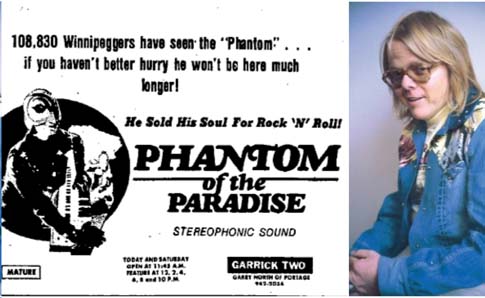 The Dissolve concludes its Movie Of The Week series on Phantom Of The Paradise with an essay Thursday by Alan Jones, which looks at the impact of the film in Winnipeg. "In summer 1975," Jones writes in the essay, "[Paul] Williams solidified the film’s popularity in the town by holding two sold-out shows, again mostly attended by so-called 'teenyboppers.' While he sang a number of the hit songs he wrote for The Carpenters and Three Dog Night, the crowd was there to see his numbers from Phantom Of The Paradise. According to Andy Mellen’s review of the show in the Winnipeg Free Press, much of the singing was 'drowned out by the constant screaming of "We love you, Paul" from the majority of his adolescent following.' He even had a phony ceremony during the concert in which he was presented a gold record for the Phantom soundtrack. (A skeptical Winnipeg Tribune writer checked with the record company and discovered the award had already been presented in Toronto.) In Winnipeg, the isolation of this phenomenon meant that the locals had no idea Williams wasn’t equally beloved elsewhere in the world, or that Phantom had only played modestly in every other city. 'None of us really knew that it bombed everywhere else,' says Carlson. In Winnipeg, where the film regularly played in local repertory cinemas over the next few decades, Phantom Of The Paradise was a classic like any other.
The Dissolve concludes its Movie Of The Week series on Phantom Of The Paradise with an essay Thursday by Alan Jones, which looks at the impact of the film in Winnipeg. "In summer 1975," Jones writes in the essay, "[Paul] Williams solidified the film’s popularity in the town by holding two sold-out shows, again mostly attended by so-called 'teenyboppers.' While he sang a number of the hit songs he wrote for The Carpenters and Three Dog Night, the crowd was there to see his numbers from Phantom Of The Paradise. According to Andy Mellen’s review of the show in the Winnipeg Free Press, much of the singing was 'drowned out by the constant screaming of "We love you, Paul" from the majority of his adolescent following.' He even had a phony ceremony during the concert in which he was presented a gold record for the Phantom soundtrack. (A skeptical Winnipeg Tribune writer checked with the record company and discovered the award had already been presented in Toronto.) In Winnipeg, the isolation of this phenomenon meant that the locals had no idea Williams wasn’t equally beloved elsewhere in the world, or that Phantom had only played modestly in every other city. 'None of us really knew that it bombed everywhere else,' says Carlson. In Winnipeg, where the film regularly played in local repertory cinemas over the next few decades, Phantom Of The Paradise was a classic like any other."WHY NOT WINNIPEG?"
Meanwhile, Phantompalooza's Rod Warkentin posted the following message to Phantompalooza's Facebook page the other day:
Is the question I ask of you? We are constantly asked, “Why Winnipeg?” my standard answer is, “We got it, no one else did”. Phantom of the Paradise is engrained in every Winnipeg adult 45 or older. When Wayne in ‘Wayne’s World’ held up the ‘Frampton Comes Alive’ album and spouted how every kid was issued it in his neighbourhood, it’s exactly that for us!
I grew up a film ‘buff...’ and still see more films than I care to admit, but the one thing I have always said, is that if a film touches you in a way that makes you think about it a few days later, then something profound was done to create thought and discussion, even if it’s just with yourself. Well, here we are...not just a few days, but 40 years later and we are still talking about Phantom of the Paradise. Not bad for a film that tanked at the box office and disappeared as quickly as it appeared. Winnipegger’s have always claimed this film as their own, I being one of them. But all that changed for me in late July of this year when I along with Creature Features hosted the 40th anniversary at the Arclight theatre in Los Angeles. Yes, I realize that Phantom was big in Paris, but for us, it was ‘our film’, plain and simple and growing up Phantom in Winnipeg was a passage that many of us took. Teenagers and children as young as ten or eleven years old watched the film, multiple times at the local theatre. Stories have been told, some made up, some wrongly translated that the youth of Winnipeg had nothing better to do because of the long cold winters and the attitude of Winnipeg that could relate to the ‘downer’ ending of the film. Now, I will be the first to admit that there is truth that Winnipeg has a reputation for cold long winters, but also Winnipeggers have a reputation of talking against the city that they call home. We do, and that should stop, but we have engrained generations with the fact that cold winters equals unattractive living and many have taken this as truth. But really that is not the Winnipeg I remember and lived and still live to this day. So ‘Why Winnipeg?’ why not? And rather than turn this into a lecture about Winnipeg’s rich history and how at one point Winnipeg was pivotal in its role in helping shape Canada, I will simply say that, “We got it, no one else did”. Winnipeg is rich in its appreciation of the arts and always has been. We are a musical city; I’ve seen more local bands go the big show than a lot of other warmer destinations. Don’t believe me, just Google it. Most of us at one point or another probably entertained the idea of being in a band, or somehow in the arts, I know I did. Theatres were abundant back in the 70’s and 80’s and seeing films was a joy that allowed us to escape the limited three channel television that we had at the time. It allowed us to see the world from a different perspective and allow our imagination to soar. Many of us went on the create our own art, write books, play music or write screenplays, some moved away and many came back after a time. It is Winnipeg, it is what we are. But Phantom was different, very different. We had always assumed that this film was a major success everywhere that it played! To find out years later that the exact opposite was true, came as a bit of a shock. The album went Gold in Canada, due to sales from Winnipeg. Hell, I remember saving up my money to buy the soundtrack only to be told that it was ‘sold-out’ and I would have to wait two weeks for it to come in again? No wonder we thought the film was a global phenomenon, it was, for us, a time before the Internet shortened the distance between all of us. I always described it to people as “our Star Wars”, it was that big. So why did this film do so well in Winnipeg? No one will ever be able to come up with the exact combination of events that brought us to the theatres, but I do know that ‘word of mouth’ advertising became one of the reasons that the film did so well. Local news had interviewed multiple viewers during their entertainment segment, newspapers had done the same, local record stores had difficulty maintaining stock of the soundtrack, even after they had done multiple advertisements in the local papers and weekly’s, older siblings told their younger counterparts who in turn told their friends and so on.
Los Angeles taught me something, but also made me lose something, something I gladly give. Phantom is no longer a ‘Winnipeg’ thing. 40 years later it has become what it always should have been, a film truly appreciated by all, even if you’re not from here. A thousand people entered the Arclight in Los Angeles! A sold-out crowd that was met with as much appreciation and enthusiasm as anything we had done in Winnipeg. When the film began, I remember the cheers and I wondered if we had finally made it up to those that originally put on the show for us. I was never sure how the film would be received in LA, but seeing every seat filled and the rush from the crowd put my mind at ease. I spoke to the crowd during the evening, but I think I was talking mostly to the cast. I wanted to say ‘See? Now everyone gets it! We aren’t the only ones. Not anymore. This film is appreciated and all the work you did.” In a way it was my thank you to all of them for what they gave us so many years ago.
So Why Winnipeg? Why not Winnipeg...it just took the majority of you 40 years to catch up to us. But don’t worry, next time, we’ll let you know a bit sooner.
Trust me...
Rod
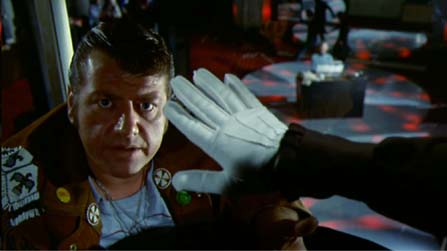 As we mentioned the pther day, Phantom Of The Paradise is the Movie Of The Week at The Dissolve this week, and things kicked off Tuesday with Noel Murray's terrific Keynote essay, "The double vision of Phantom Of The Paradise."
As we mentioned the pther day, Phantom Of The Paradise is the Movie Of The Week at The Dissolve this week, and things kicked off Tuesday with Noel Murray's terrific Keynote essay, "The double vision of Phantom Of The Paradise."Be sure to check out The Dissolve's staff forum on Phantom.
POP MATTERS: "MY FIRST MIDNIGHT MOVIE"
Meanwhile, at PopMatters, Bill Gibron posts about seeing Phantom Of The Paradise at a packed midnight screening when he was just 13. Here's an excerpt:
Back in 1974, however, Tom and I were dumbstruck. We were both terrified and oddly intrigued. This was like nothing we had ever seen before, and even then, a legitimate frame of reference probably wouldn’t have helped. I remember being taken in by Winslow’s opening number, a sweeping piano piece that, even today, gives me goosebumps.
I didn’t get the reference in the title, “Faust”, but I could see how it fit in the film. I didn’t remember any other music (except for Beef’s final performance where he picked up members of the crowd and threw them like ragdolls back into the throng before being electrocuted by the Phantom with neon lightning bolts). Today, the film plays like a lost gem. Back them, Tom and I were convinced we had lost our minds.
Maybe it was a bit of a contact high. Perhaps we were just too young to appreciate the whole midnight movie experience. By the time we walked out of the theater it was clear that both Tom and I were deep in our own little world. Dazed, we almost passed his mother, car idling, her hair in a mess of curlers and wearing a sheepish housecoat. It was close to 2AM. We never stayed up that before.
Even after we were at Tom’s house and settled in to his basement train set-up/bedroom area, we were electric. We talked and talked. We puzzled and questioned. We tried to make sense of what we saw. For at least two weeks afterwards, we spent countless hours in conversation with our mutual friends just trying to figure out what the heck happened, and when we could experience something similar again.
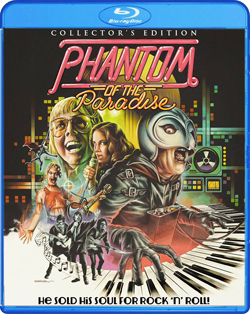 I'm still delving into the treasures of Scream Factory's new Blu-ray release of Brian De Palma's Phantom Of The Paradise, but I can say that the new interviews with De Palma and (separately) Paul Williams are full of insights into the ideas and production of the film, and the brief interview with make-up effects artist Tom Burman is also quite interesting (Burman never met De Palma while working on it, but became a fan after seeing the finished film, which he still thinks is one of De Palma's best). And being able to see the alternate takes and outtakes side-by-side with the completed film versions, in high-definition, is also very, very nice.
I'm still delving into the treasures of Scream Factory's new Blu-ray release of Brian De Palma's Phantom Of The Paradise, but I can say that the new interviews with De Palma and (separately) Paul Williams are full of insights into the ideas and production of the film, and the brief interview with make-up effects artist Tom Burman is also quite interesting (Burman never met De Palma while working on it, but became a fan after seeing the finished film, which he still thinks is one of De Palma's best). And being able to see the alternate takes and outtakes side-by-side with the completed film versions, in high-definition, is also very, very nice."The hyper-saturated colors and varied soundtrack (which Williams supervised) make Phantom a worthwhile Blu-ray purchase. The jam-packed collector's edition from Shout Factory includes a new, 50-minute documentary on the film's making, a commentary track with several of the actors, and an interview with De Palma in which he admits to being a fan of the reality show Survivor.
"The highlight, though, is an amiable, wide-ranging chat, over an hour long, between Paul Williams and Pacific Rim director Guillermo Del Toro, who seem to be old pals. Unexpected? Sure, but no more so than anything on screen in Phantom of the Paradise."
Sean Lass, Playback: stl
"I don’t even know how to begin talking about 1974’s Phantom of the Paradise. How can I describe this film to anyone who hasn’t seen it? The plot is fairly straightforward (a modern retelling of The Phantom of the Opera, with elements of Faust and other classic stories thrown in), but the overall experience of the film is so wonderfully weird and unique that you really just have to see it for yourself. And you should, because it’s an absolute blast."
John Semley, MacLean's
HEADLINE: "Was Winnipeg right about Phantom of the Paradise all along?"
"Rod Warkentin was born and raised in Winnipeg. He saw Phantom with his sister at the Garrick Theatre when he was 10. He estimates he saw it 29 more times in its initial Winnipeg run. 'It caught on with word-of-mouth,' he explains. 'Something about it appealed to the youth. Anyone who’s our age who grew up in Winnipeg, you ask them about it and they’ll say, "Oh yeah, it’s phenomenal."’...
"The story goes that Guy Manuel de Homem-Christo and Thomas Bangalter of Daft Punk met as teens at a Paris screening, launching a creative partnership that culminated in a collaboration with Williams on their 2013 hit record. 'They saw Phantom of the Paradise together more than 20 times,' Williams boasts. 'It’s their favourite movie!'
"It’s odd drawing a line between French techno-pop icons and 50-year-old Winnipeggers. But Phantom has a universal quality. 'I’m reluctant to call myself a sex symbol, but Swan was sexy,' says Williams. 'I think it showed people that you could still get things if you were the runt of the litter.' For Warkentin, Phantom’s recuperation has more to do with the unforgiving pessimism that boils beneath the campy veneer. It’s the sort of thing that would naturally play with self-persecuting adolescents, from Paris to the ’Peg. 'Nobody gets what they want in the film,' he notes. 'No one wins.'”
Glenn Kay, CinemaStance
"It’s an excellent movie that was ahead of its time and satirically skewers not only the music business as a whole, but the fans who clamor for more. By the time it’s over, showmanship begins to mesh with reality all for the sake of entertainment – the film’s villain even plots an on-camera assassination of an artist to boost record sales. It’s hard to watch and not think about how many things about the industry that it predicted forty years ago. The movie is well cast with both likable and memorable characters, who all desire fame and public success to some degree and ultimately pay a high price for it.
"It is also a striking, visual treat highlighting a wildly exaggerated color palette. As expected, director De Palma’s camera moves are also incredible, some memorably shot sequences. One standout is an event staged and filmed with two cameras in splitscreen while other notable moments feature unique angles or are filmed in rooms filled with giants mirrors – it’s amazing that the camera itself never appears to be visible in any of these scenes at any point."
Jeffrey Kauffman, Blu-ray.com
"Paul Williams is certainly one of the more unlikely multimedia stars of his generation. Elfin in appearance and kind of generally odd looking anyway, Williams also has a kind of nasal singing voice that's unvarnished but hardly a technical marvel. And yet this diminutive sprite has managed to chalk up not just scores of film and television appearances, but innumerable hit records (albeit sung by other, perhaps more vocally gifted, artists). While Williams had already managed to carve out a few lesser acting roles by the time he made Phantom of the Paradise in 1974, he was already a show business phenomenon courtesy of his still impressive songwriting skills. Both on his own and with his frequent collaborator Roger Nichols, Williams had become the go-to hitmaker for such chart topping acts as The Carpenters ('Rainy Days and Mondays', 'We've Only Just Begun') and Three Dog Night ('Out in the Country', 'An Old Fashioned Love Song'). Still, as even Williams himself seems to realize in the interview included on this Blu-ray as a supplement, he seemed like an odd choice to both provide the song score and star in Brian De Palma's whimsical reimagining of a kind of mashup between The Phantom of the Opera and The Picture of Dorian Gray. Phantom of the Paradise's song score is a pastiche driven amalgamation that runs the gamut from singer-songwriter confessional material to proto-fifties' doo-wop outings, and neither of those idioms, nor anything else musical in the film, would seem to suggest Paul Williams as the perfect choice. But Williams had already begun to stretch musically, as evidenced by his facile lyrics for the criminally underappreciated pop-rock cantata Wings by the late French master Michel Colombier. (Colombier had a noted—no pun intended—if also underappreciated film scoring career, including the recently released Une Chambre en Ville.)...
"Phantom of the Paradise might seem like an unlikely effort from the likes of Brian De Palma, but the film actually traffics in many of the same ideas that have informed some of his more commercially successful films like Carrie. Once again there's a lonely outcast who's specially 'gifted', and once again carnage explodes when the outsider isn't given his or her due. While there's no religious subtext here a la Carrie (unless one subscribes to the opinion that rock is religion), there's a sinister melancholy that creeps through the film that seems to suggest that poor Leach has been abandoned not just by his fellow man, but by whatever Divine presence there may (or may not) be in the world. Finley delivers an amazing performance in this film, all the more remarkable in that virtually his entire face is hidden behind a helmet, and really only his mouth and one eye are visible. But the anguish and rage of this character are virtually palpable almost all of the time.
"The film is a visual phantasmagoria, one of De Palma's most hallucinogenically outrageous achievements in production and costume design. The finale of the film is like a rock concert being run by and attended by a pack of wild, peyote intoxicated, wolves. Through it all, Williams' music (and even his voice—he serves as the singing voice of Leach) wends its way through innumerable genres as The Juicy Fruits change both their band name and their look (repeatedly). Williams was something of a 'staff writer' at A&M Records, arriving at the label just as Carpenters were taking off to be the biggest act of the early seventies. While Williams disparages many of his tunes as mere 'easy listening' fodder, his oeuvre during this period is really rather impressively diverse. This proved to be Williams' second Oscar nomination (the first was for the prior year's 'Nice to be Around' from Cinderella Liberty, which Williams co-wrote with another Williams, John), and while he didn't take home the trophy that year (Nelson Riddle received what was probably a 'career Oscar' for The Great Gatsby), it's probably Williams' score that is one of Phantom of the Paradise's most enduring achievements. You might even say the song score is devilishly good."
Budd Wilkins, Slant
"Phantom of the Paradise doubles down on the winking intertextuality that has always characterized De Palma's cheekiest work. The film's broad-strokes indebtedness to its thematic forebears (Faust, The Phantom of the Opera, The Picture of Dorian Gray) is noticeable enough to be spotted through the blinkered monocular gaze of the Phantom's helmet. And with its riotous Psycho 'shower scene' riff, De Palma crams a plunger over the puss of detractors who dismissed him as little more than a discount-Hitchcock rehash slinger. But the finer-grained citations are there for the delectation of eagle-eyed cinephiles: The bomb in the trunk of the Beach Bums' jalopy carries more than a Touch of Evil, and Swan's attempted assassination of Phoenix on live TV sets its sights on John Frankenheimer's scarily prescient The Manchurian Candidate.
"That's not to discount the finale's profound resonance with other De Palma films. The orgiastic revelry of the wedding distinctly recalls Dionysus; in fact, De Palma had members of that film's cast planted among the extras to whip up their frenzy. And there's more than a whiff of 'Be Black, Baby' from Hi, Mom! in the scene's avant-garde theatrical staging. Then again, the conflation of political assassination and public spectacle points to Blow Out, the one film that stands shoulder-to-shoulder with Phantom of the Paradise for the disconsolation of its final moments. This is De Palma pouring the new wine of his formal inventiveness and anti-authoritarian irreverence into the old bottles of archetypal myths, and it remains a supremely entertaining anomaly within his filmography, yet entirely emblematic of his filmmaking sensibilities."
Patrick J. Doody, Retroist
"Man, this is a weird movie. Not just like 'trippy' because it’s from the 70s, but it’s…really out there and I loved it. I think I responded to the material because the look and sound of the film is not only pure pop art, it’s authentic pop art. It never feels like DePalma tried to make a 'modern' or 'hallucinatory' film that the young people could understand. He made a film that used the look and style of the period and then made it his own. It’s not cheesy or trying to be cool, it just is cool and it totally holds up."

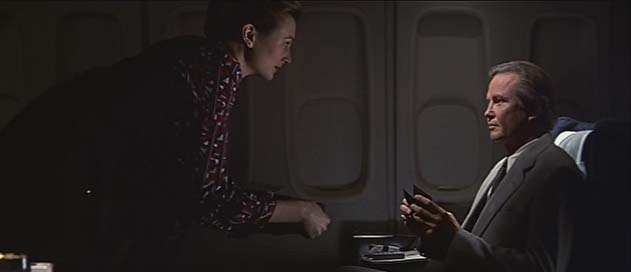
Voight: I actually wrote another ending for the first movie and I gave it to Tom [Cruise]. I don’t know if I wrote it out, but I had this idea that they found messages coming and it was from Jim Phelps. They thought they killed him but they hadn’t killed him, and he returns, and the other guys return too. The people he thought were dead were not dead. It was all to try to get the mole. He was being used by us, but it didn’t work out.
Topel: Did you discuss that with Brian De Palma?
Voight: Yeah, I think I did. He wasn’t interested.
Topel: The thing was Jim was the hero on the TV show.
Voight: I felt badly about spoiling that image. I felt bad about it.
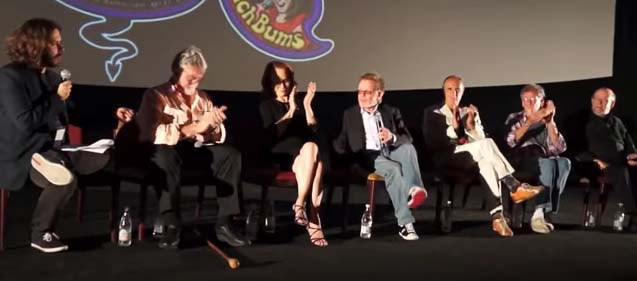
Edgar Wright [to Gerrit Graham]: And you worked with Brian twice before this—Greetings and Hi, Mom.
Gerrit Graham: Right. I was a sophomore at Columbia University in New York City. I then made general manager of the Columbia Players, basically because nobody else wanted the gig, and it was the extracurricular theater group. And one day I was down in the Players office, during a non-production period, which was extremely unusual that I was down there at all, and the phone rang, and it was this guy saying, "I was in the Players years ago, for old-times’ sake, you guys might be willing to help me with..." he wanted extras, and I could make wardrobe stuff. "Sure, sure, sure." And he said, "I would also be happy if you could find me a couple or three actors, experienced actors, particularly with comedic experience. People in the fine arts program there, or Minor Latham Playhouse, across the street… And if you find people like that, will you send them down to see me?" And I said, "I sure will. And what is that address again, Mr. De Palma?"
And you must guess by now that I never sent another soul down there. I went to see him myself, and ended up in the living room with a producer, who happens to be the brother of our editor, and improvised with… well, there was another guy named Bob who was there all the time, and a third guy sort of rotated in and out. And we just improvised on various suggestions that Brian made, and ultimately ended up with Bob De Niro, and me, and a third guy named Jonathan Warden. And Brian had a scenario without a script. And he had certain ideas that he wanted to make sure made it in. But we improvised the entire thing. And same thing with the sequel, the following year, a sort-of sequel called Hi, Mom! And by the time we got to Phantom, he just called and asked me if I wanted to play the part. And interestingly, the part he initially offered me was Swan. [Looking at Paul Williams] I don’t know if you knew that.
Paul Williams: Oh, I did know. And at one point he asked me about playing, my initial offer was Winslow. And I went, "I’m too little to be scary. You know, you picture this little guy throwing things down and…" [laughter]. What Bill Finley did with one eye, I don’t know another actor could do what he did [applause].
Wright: I don’t know anybody else that could pull off Beef.
Graham: Well, I was young dumb and full of cum [laughter]. I don’t have a really clear picture of what I was doing. Brian asked me to come out and audition musically, I think it was, for him [points to Williams], and for Paul, and [looking at Williams] I don’t know if you remember this: "Well, that was good… can you make it a little more, uh, sort of, uh, bigger? More…" And finally the word they settled on was "flamboyant." [Laughter] "Would you make it a little more flamboyant?" Which was, of course, code at the time for "gay," and I said, [puts hand on hip] "What do you mean, like this?" [Pointing] "Bingo! That’s it!"
Williams: Brian said, "Yes!"
Graham: And to me it was just cheap schtick, you know? But it turned out to be an actual character. It was just something in me [poimts to his own brain]. I don’t know what that says about my sick brain, but it’s just the character that came out fully-formed. Because of the earlier films I’d done with Brian, and that relationship, I trusted him and he trusted me that we would be able to satisfy each other’s aims and intentions. So I had a great deal of freedom. A great deal of freedom to do whatever I wanted. And one of those lines in the scenes with George Memmoli—and I must say here at this point, those scenes are funny because there were two people involved, one was me and the other was George Memmoli, and those scenes would not have worked without George [applause]. It was what you might call a double-act. But lines that are among peoples’ favorites, like "Dry-up, Tubbo," [Jessica Harper tells him to say it again, in character] "Dry up tubbo." [Laughter] For my lines, they were improvised, it didn’t strike me at the time as interesting or difficult or anything.
PAUL HIRSCH'S FIRST LOVE WAS MUSIC; PAUL WILLIAMS FEELS THE RHYTHM OF 'PHANTOM'
Wright [to Paul Hirsch]: After you had already done Sisters with Brian De Palma, you would go on to have much bigger hits with Brian, and some of the biggest hits of all time, Star Wars, Empire Strikes Back, but this really, when you were making it, you must have been aware, you know, you were pushing the boundaries, you kind of… in terms of the producers and the studio, were they even aware of what they were gonna get, with the finished product?
Paul Hirsch: Well, I don’t know that we had that kind of perspective on what we were doing, we were just doing it. We weren’t outside ourselves looking at ourselves doing it. And it has to be pointed out that this was not a studio production. This was an independent production that was picked up by 20th Century Fox. The picture would never get made today, and probably wouldn’t have gotten made then, if not for having been an independent production.
But, it was a thrill for me, because I had been a music student in high school. I took music and art in New York. And I played the drums, and music is my first love. And I’m not really a great musician. I’m a music lover more than a musician. And to edit a musical was for me… it used all my musical ability for whatever it is, and it was extremely fun. And it’s interesting watching it. I haven’t seen this picture in forty years. I remember the montage at the end, where we highlight the members of the cast, we had this song that had not been used in the film, and we wanted to use, this wonderful song, and upbeat—ironically upbeat, but upbeat nonetheless—and we felt that the ending of the picture was kind of very depressing, and we wanted to remind the audience of what a wonderful time they had during the first hour and a half. So, we added this montage at the end to lighten the mood.
Paul Williams: Two things I wanted to say: one is, if you watch a movie that was made forty years ago, you’ll notice a difference in the rhythm of the way a film was cut. Things are cut so much quicker now. So if I see pictures that I really love from thirty or forty years ago, sometimes the cut is too slow for me. That never happens in this. [Speaking to Hirsch] Watching your editing of Phantom Of The Paradise, I don’t think there’s a spot in there where I feel anything close to a lag. [Snapping his fingers with rhythm] It’s the timing of it, and it relates to the music, as well. I mean, there’s something in that.
And what was the other thing I was going to say, because it was really great, too [laughter]. Oh, I know what I was going to say. Originally, the song—one of the great tragic moments for me was when we didn’t get to shoot the scene The Hell Of It was written for. Because originally there was a graveyard scene where, you know, a big funeral scene for Beef’s funeral, and [looking toward Hirsch] I don’t know why we never shot it, I don’t know if we didn’t have any money, (nodding) was it finances? Didn’t have enough money to shoot it.
But what I wanted to do was kind of take off on Nina Rota, you know, and do that kind of 8 1/2 ending, with everybody dancing around in a little circle around the grave, and if you follow all the cables, you go back to a hearse, [smiling] where Swan is recording the funeral, and at the very end a little girl jumps on the casket that’s being lowered into the grave and starts tap dancing, auditioning for Swan [laughter], and that’s what that sound is [mimics piano playing]. But thank God, instead of it getting tossed out [gesturing toward Hirsch], you grabbed it, cut the end credits to it, and it’s one of my favorite things that’s in there at the end. [Applause as Hirsch tells him, “Thank you.”]
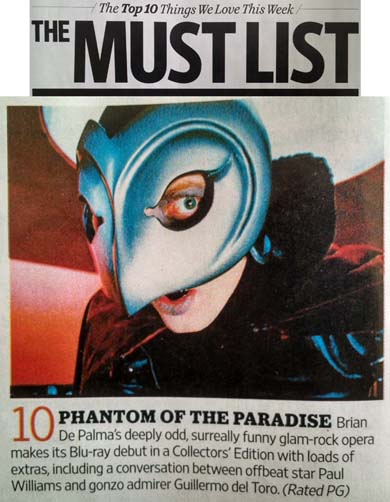 Phantom Of The Paradise has made this week's "Must List" in the current issue of Entertainment Weekly. It's the August 8 2014 issue, with Doctor Who on the cover. The Swan Archives points out that back in 2006, EW published its list of Five Must-See Glam Rock DVDs, adding insult to Phantom Of The Paradise at the bottom by giving the film its own category: "one to skip."
Phantom Of The Paradise has made this week's "Must List" in the current issue of Entertainment Weekly. It's the August 8 2014 issue, with Doctor Who on the cover. The Swan Archives points out that back in 2006, EW published its list of Five Must-See Glam Rock DVDs, adding insult to Phantom Of The Paradise at the bottom by giving the film its own category: "one to skip."
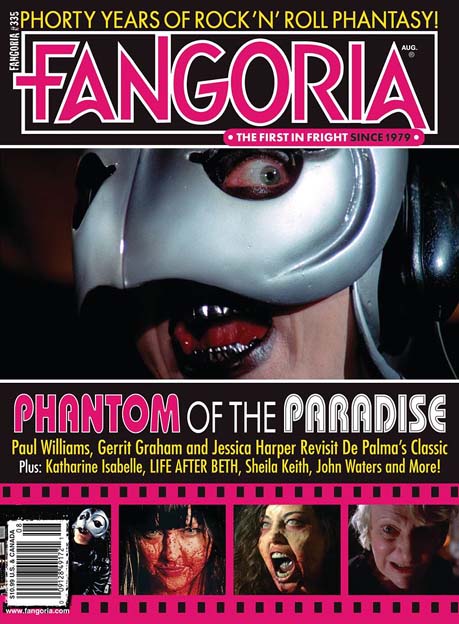 This is the cover of the upcoming issue of Fangoria, coming soon...
This is the cover of the upcoming issue of Fangoria, coming soon...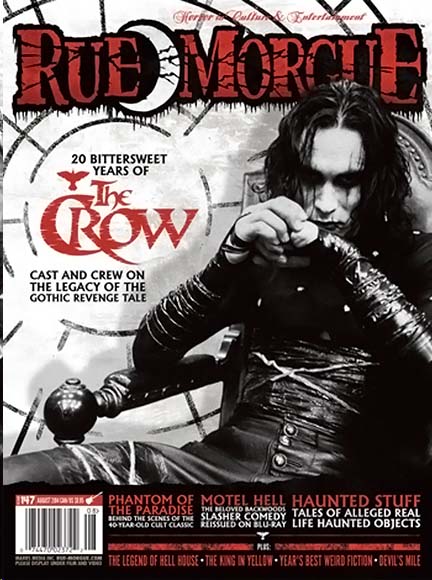 And issue #147 of Rue Morgue, out now, includes a Phantom Of The Paradise retrospective written by Justin Humphreys, author of Interviews Too Shocking To Print!. The magazine article includes material from the book's interviews with William Finley and Jack Fisk, as well as brand new interviews with Ed Pressman, Jeffrey Comanor, Peter Elbling, production manager Gary Kent, and Phantompalooza organizer Gloria Dignazio.
And issue #147 of Rue Morgue, out now, includes a Phantom Of The Paradise retrospective written by Justin Humphreys, author of Interviews Too Shocking To Print!. The magazine article includes material from the book's interviews with William Finley and Jack Fisk, as well as brand new interviews with Ed Pressman, Jeffrey Comanor, Peter Elbling, production manager Gary Kent, and Phantompalooza organizer Gloria Dignazio.